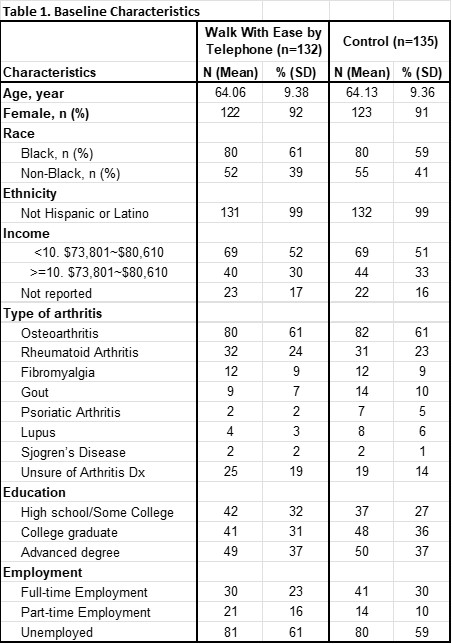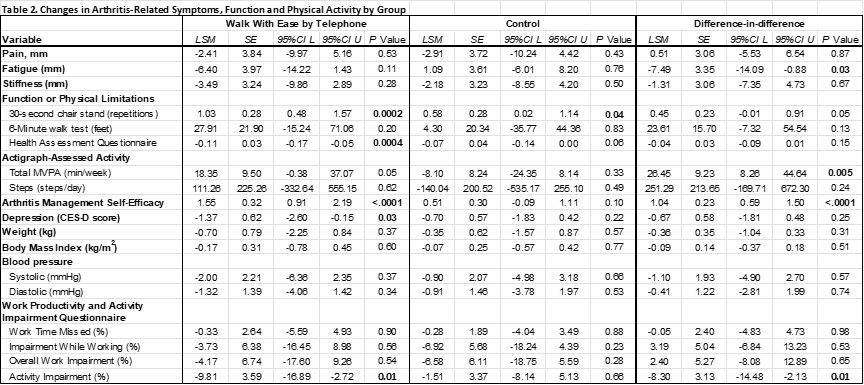Session Information
Session Type: Abstract Session
Session Time: 3:00PM-4:30PM
Background/Purpose: Walk With Ease (WWE) is a 6-week arthritis-appropriate evidence-based physical activity program traditionally offered in a face-to-face format. However, as many populations encounter participation barriers to in-person programs like WWE, we modified this program for telephone delivery (WWE-T). The purpose of this study was to evaluate the short-term (6 weeks) effects of WWE-T on ActiGraph-assessed physical activity and arthritis-related outcomes.
Methods: Adults (n=267) with a healthcare provider diagnosis of arthritis, lupus, gout, or fibromyalgia were randomized to start the program either immediately (WWE-T) or after 1 year (waitlist control). WWE-T consisted of 2 telephone calls/week (1 group call [WWE leader and other WWE participants] and 1 individual call [WWE leader only]) for 6 weeks. Group calls focused on arthritis education and social support. Individual calls focused on problem solving and goal setting. WWE-T participants also received an Arthritis Foundation WWE Guidebook. Outcomes assessed at baseline and 6 weeks included: pain, fatigue, and stiffness (visual analog scale), physical function (30 second chair stand test, 6-min walk test, and Health Assessment Questionnaire [HAQ]), moderate-vigorous intensity physical activity and steps (ActiGraph GT9X Link worn on waist for 7 days), self-efficacy (Arthritis Self-Efficacy Scale), depressive symptoms (CES-D 10), weight (kg), blood pressure (mmHg), and work loss (Work Productivity and Activity Impairment Questionnaire). Mixed models, adjusting for covariates, were used to examine differences between groups across time.
Results: A total of 267 participants were randomized (92% female, 60% Black, 64.1±9.4 years, BMI of 34.2±7.7 kg/m2, 52% had an income < $52,000) (Table 1). Retention was 93% at 6 weeks, with no difference between groups. WWE-T participants attended 9.8±2.6 calls. Group calls were on average 52.0±5.6 minutes and individuals calls were 12.0±4.0 minutes. At 6 weeks, the WWE-T group had a greater improvement in fatigue (-7.5 mm [95% CI -14.1, -0.9] P< 0.05), moderate-vigorous intensity physical activity (26.5 min/week [95% CI 8.3, 44.6], P< 0.05), self-efficacy (1.0 [95% CI 0.6,1.5] P< 0.001), and percent activity impairment due to health (-8.3% [95% CI -14.5, -2.1] P< 0.05) as compared to control (Table 2). HAQ function (-0.11 [95% CI -0.2, -0.1] P< 0.001), 30 second chair stand test (1.0 repetitions [95% CI 0.5,1.6] P< 0.001), and depressive symptoms (-1.4 [95% CI -2.6, -0.2], P< 0.05) significantly improved in the WWE-T group, but no changes or differences in Control. There were no differences between groups or across time in the remaining outcomes.
Conclusion: A WWE program delivered by telephone is effective at increasing ActiGraph-assessed MVPA, reducing fatigue, and improving arthritis management self-efficacy in adults with arthritis at 6 weeks. This telephone-delivered program may be an effective alternative for adults with arthritis and other hard-to-reach populations who may face barriers to in-person physical activity programs.
To cite this abstract in AMA style:
Pellegrini C, Wilcox S, Kim Y, Devivo K, Jamieson S, Horn K, Heidtke D. Short-Term Effectiveness of a Walk with Ease Program Delivered by Telephone on Arthritis-Related Symptoms, Function, and Physical Activity [abstract]. Arthritis Rheumatol. 2024; 76 (suppl 9). https://acrabstracts.org/abstract/short-term-effectiveness-of-a-walk-with-ease-program-delivered-by-telephone-on-arthritis-related-symptoms-function-and-physical-activity/. Accessed .« Back to ACR Convergence 2024
ACR Meeting Abstracts - https://acrabstracts.org/abstract/short-term-effectiveness-of-a-walk-with-ease-program-delivered-by-telephone-on-arthritis-related-symptoms-function-and-physical-activity/


